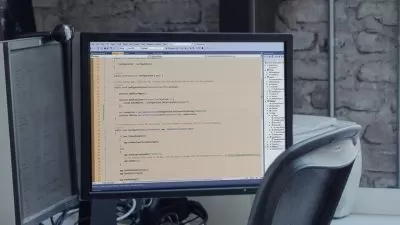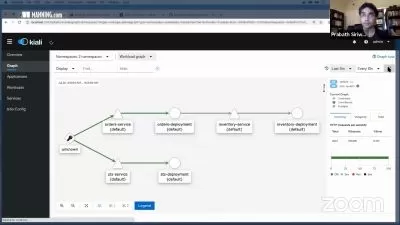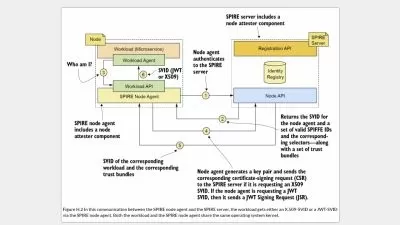Microservices in .NET Second Edition VideoEdition
Focused View
8:39:37
69 View
1 - Part 1. Getting started with microservices.mp4
01:10
2 - Chapter 1. Microservices at a glance.mp4
10:33
3 - Chapter 1. Microservice characteristics.mp4
11:25
4 - Chapter 1. Why microservices.mp4
08:48
5 - Chapter 1. Costs and downsides of microservices.mp4
09:19
6 - Chapter 1. Serving a user request - An example of how microservices work in concert.mp4
06:06
7 - Chapter 1. A .NET microservices technology stack.mp4
08:52
8 - Chapter 1. Adding ASP.NET MVC to the project.mp4
07:16
9 - Chapter 2. A basic shopping cart microservice.mp4
07:12
10 - Chapter 2. Implementing the Shopping Cart microservice.mp4
06:31
11 - Chapter 2. The Shopping Cart microservices API for other services.mp4
08:23
12 - Chapter 2. Fetching product information.mp4
09:12
13 - Chapter 2. Implementing a basic event feed.mp4
09:51
14 - Chapter 3. Deploying a microservice to Kubernetes.mp4
07:07
15 - Chapter 3. Putting the Shopping Cart microservice in a container.mp4
06:13
16 - Chapter 3. Running the shopping cart container in Kubernetes.mp4
07:04
17 - Chapter 3. Running the shopping cart container on Azure Kubernetes Service.mp4
07:36
18 - Chapter 3. Running the shopping cart in AKS.mp4
07:44
19 - Part 2. Building microservices.mp4
01:32
20 - Chapter 4. Identifying and scoping microservices.mp4
08:21
21 - Chapter 4. Example - Point-of-sale system.mp4
07:25
22 - Chapter 4. The secondary driver for scoping microservices - Supporting technical capabilities.mp4
10:41
23 - Chapter 4. Identifying technical capabilities.mp4
07:58
24 - Chapter 4. What to do when the correct scope isnt clear.mp4
10:00
25 - Chapter 4. Planning to carve out new microservices later.mp4
11:34
26 - Chapter 5. Microservice collaboration.mp4
11:51
27 - Chapter 5. Events - Asynchronous collaboration.mp4
08:04
28 - Chapter 5. Implementing collaboration.mp4
08:06
29 - Chapter 5. Implementing an event-based collaboration.mp4
08:33
30 - Chapter 5. Building a Docker container special offers microservice.mp4
10:37
31 - Chapter 6. Data ownership and data storage.mp4
06:35
32 - Chapter 6. Rule 2 - Replicate for speed and robustness.mp4
10:04
33 - Chapter 6. Where does a microservice store its data.mp4
05:07
34 - Chapter 6. Implementing data storage in a microservice.mp4
09:44
35 - Chapter 6. Storing events raised by a microservice.mp4
08:50
36 - Chapter 6. Setting cache headers in HTTP responses.mp4
05:36
37 - Chapter 7. Designing for robustness.mp4
07:21
38 - Chapter 7. Using trace IDs.mp4
07:00
39 - Chapter 7. The client sides responsibility for robustness.mp4
09:42
40 - Chapter 7. Implementing robustness patterns.mp4
06:30
41 - Chapter 7. Implementing a circuit breaker with Polly.mp4
07:05
42 - Chapter 8. Writing tests for microservices.mp4
08:01
43 - Chapter 8. Service-level tests - Testing a microservice from outside its process.mp4
11:05
44 - Chapter 8. Testing libraries - Microsoft.AspNetCore.TestHost and xUnit.mp4
08:42
45 - Chapter 8. Writing unit tests using Microsoft.AspNetCore.TestHost.mp4
09:12
46 - Chapter 8. Writing service-level tests.mp4
10:13
47 - Part 3. Handling cross-cutting concerns - Building a reusable microservice platform.mp4
01:49
48 - Chapter 9. Cross-cutting concerns - Monitoring and logging.mp4
07:18
49 - Chapter 9. Tracing requests across microservices.mp4
08:25
50 - Chapter 9. Implementing the monitoring endpoints.mp4
09:12
51 - Chapter 9. Adding a trace ID to all log messages.mp4
10:53
52 - Chapter 10. Securing microservice-to-microservice communication.mp4
08:44
53 - Chapter 10. Authorizing users in microservices.mp4
10:13
54 - Chapter 10. Limiting which microservices can communicate.mp4
06:41
55 - Chapter 11. Building a reusable microservice platform.mp4
09:18
56 - Chapter 11. Packaging and sharing cross-cutting code with NuGet.mp4
11:21
57 - Chapter 11. The ASP.NET pipeline.mp4
06:28
58 - Chapter 11. Writing middleware.mp4
08:11
59 - Part 4. Building applications.mp4
00:26
60 - Chapter 12. Creating applications over microservices.mp4
08:42
61 - Chapter 12. Patterns for building applications over microservices.mp4
09:02
62 - Chapter 12. Backend for frontend (BFF) pattern.mp4
10:33
63 - Chapter 12. Example - A shopping cart and a product list.mp4
10:04
64 - Chapter 12. Creating the shopping cart GUI.mp4
06:26
More details
User Reviews
Rating
average 0
Focused display
Category

O'Reilly
View courses O'ReillyO'Reilly Media is an American learning company established by Tim O'Reilly that publishes books, produces tech conferences, and provides an online learning platform. Its distinctive brand features a woodcut of an animal on many of its book covers.
- language english
- Training sessions 64
- duration 8:39:37
- Release Date 2023/11/06








